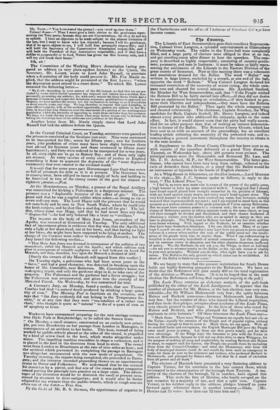:be Country.
The Liberals of East Somersetshire gave their excellent Represenaa- tive, Colonel Gore Langton, a splendid entertainment at Glastonbury on Wednesday week. The tables in the Town-hall were completely filled, and a large party of electors were obliged to dine at an inn, and get standing-room after dinner to hear the speeches. The com- pany is described as highly respectable ; consisting of country gentle- men, yeomanry, and men in business : it must be taken as fairly repre- seating the sentiments of the Liberals in the Eastern Division alum great county of Somerset. Now at this meeting there was a vehement and unanimous demand for the Ballot. The word " Ballot" was written in large letters, encircled by a wreath, at one end of the ball, opposite the word " Reform." When Colonel Langton declared his increased conviction of the necessity of secret voting, the whole com- pany rose and cheered for several minutes. Mr. Ayshford Sanford, the Member for West Somersetshire, said, that " if the People wished the Reform Bill to be fairly carried into effect,—if they did not desire to see an excitement bordering on revolution,—if they desired tore- serve their liberties and independence,—they must have the Reform Bill protected by the Ballot." Then again the whole company rose and cheered vehemently. The chairman, Captain Strachey, the Whig candidate for Bath, Captain Scobell, Mr. Henry Langton, and indeed almost every person who addressed the company, spoke to the same effect. In fact, it would almost seem that the party bad really assem- bled for no other purpose than that of making an earnest demonstra- tion in favour of the Ballot. The Somerset County Gazette, which has been sent to us with an account of the proceedings, has an excellent leading article enforcing the necessity of the protected vote, and re- commending a general movement throughout the country to obtain it in the next session.
A Supplement to the Dorset County Chronicle has been sent to us, with reports of the speeches delivered at a grand Tory dinner at Taunton, on Wednesday last : about 500 persons were present. The principal orators were the Honourable and Reverend Mr. Law, and Mr. T. D. Acland, M. P., for West Somersetshire. The latter gen- tleman, who cannot have been very long from college, referred to the exile of Aristides from Athens, its a proof that the Ballot would be an instrument of injustice in the hands of English electors !
At a Whig dinner in Gloucester, on the:21st instant,--Lord Moreton in the chair,—Mr. J. C. Symons spoke as follows, in reply to the toast, " The Liberal Press"- " I feel it, as every man must who is aware of the power of the public press, a high honour to have my name associated with it. I imagined that I should have found myself placed here to-night somewhat in the position of Ishmael, with my hand against every man's, and every man's hand against mine. The very kind manner in which you have received my name, has, however, entirely removed that impressionfrom my mind ; and I am rejoiced to stand here on this occasion as a zealous advocate of the great principle of Union among Reformers. But we must have common means to a common end ; for so long as different classes of Reformers persist in taking separate roads to the same object, so long will their strength be divided and diminished, and their chance weakened of obtaining a victory over the faction who are as united in energy as they are base in principle. The Whig road to Reform has had a very fair trial, and has been found wanting. With regard to the Radicals, let us examine whether they have been themselves blameless. I for one think not. Many of us (per- haps I myself ant one of the number) may have been too prone to press extreme reforms at a season when neither the tone of the public mind nor the intelli- gence of the people were ripe to receive them. What I am endeavouring to establish is the necessity henceforth of mutual concession. Let the one party put its extreme views in abeyance, and the other abandon its proven inefficacy of policy. We, the Radicals, do not ask you, the Whigs, to meet us half-way —we ask you to advance merely to the Ballot, as the one sole means of vitality to your own principles. Without you do this, what right have you to ask for union. The Ballot is the only ground on which union can be established. All short of the Ballot is futile to our cause."


























 Previous page
Previous page